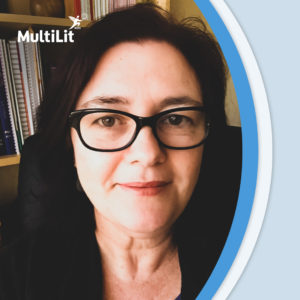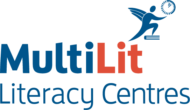Clinical Director, MultiLit Literacy Centres and Senior Research Fellow, MultiLit Research Unit
BA Dip Ed (Primary) Grad Dip Spec Ed PhD
Dr Alison Madelaine has extensive knowledge in reading development, instruction and assessment, as well as hands-on experience teaching students with reading difficulties in Australia and the United States.
Learn more about her role with MultiLit.
What inspired you to get into education?
I’ve always been a little bit obsessed with books and reading in my personal life, and I can’t stand the thought of others not being able to read for pleasure. This is really what led to my studying education and pursuing teaching in one form or another.

Tell us a bit about your background and experience.
Originally, I trained as a primary teacher, but very quickly realised I wanted to work with children with learning difficulties, and enrolled in the Graduate Diploma in Special Education at Macquarie University Special Education Centre (MUSEC). Shortly after completing that course I got a job at MUSEC, teaching in the Early Intervention Program which operated at the time. That first job in special education led to an academic career at MUSEC that would last almost 20 years!
My school-based classroom teaching experience has included teaching in primary/elementary schools in South Western Sydney and in South Carolina, USA. Both schools served quite diverse and disadvantaged students, so my special education training was always well-utilised.
As a lecturer at MUSEC, I taught postgraduate students in the areas of literacy, research methods and behaviour management in addition to contributing to some undergraduate units in special education. In 2004, I was awarded a Doctor of Philosophy from Macquarie University, with a thesis entitled Curriculum-based Measurement of Reading and Teacher Judgment of Reading Performance.
How long have you worked for MultiLit?
I have worked for MultiLit in my current role for five years, but my association with MultiLit goes back a lot further – almost to the very beginning! In addition to my work in the last five years, I have previously worked for MultiLit as a consultant, with involvement in many of the projects aimed at teaching reading and related skills to disadvantaged students, including those in Cape York in Far North Queensland, and Sydney’s inner and western suburbs.
What are some of the key responsibilities of your role?
I am currently a Senior Research Fellow within the MultiLit Research Unit (MRU) and Clinical Director of the MultiLit Literacy Centres. My role as Senior Research Fellow is quite varied. One of my key responsibilities is to act as MRU lead on various product development projects undertaken at MultiLit. This involves working closely with the Product Development team to ensure that our programs and other materials reflect the latest research and best practice.
In my role as Clinical Director, I liaise with Literacy Centre Managers to ensure that assessment and instruction in reading and related skills is of a high quality and consistent across centres. I also provide advice to Centre Managers regarding instructional changes for students who are not making enough progress.
What’s one thing you wish more people knew about literacy?
It’s very hard to pick just one thing — so I’m going to pick two! Firstly, I wish more people knew that all but a very (very) small percentage of children (and adults) can become literate with the right instruction.
Secondly, in order to become a good reader, and to keep getting better at reading, a lot of reading practice needs to happen, both at school and at home. This second point may seem obvious, but it is quite amazing how little some children read in any given day and even small amounts of practice per day add up over time.
